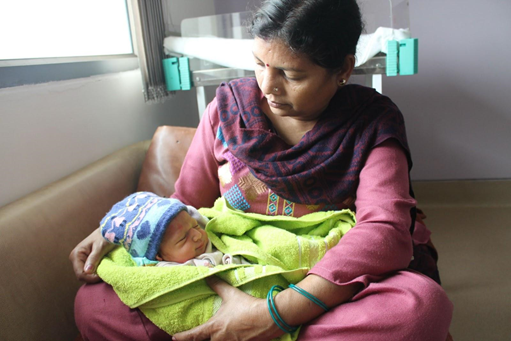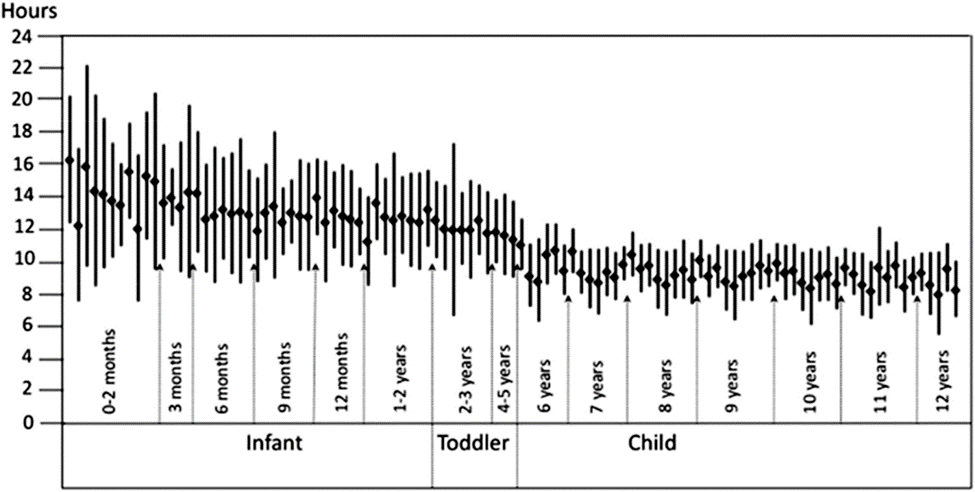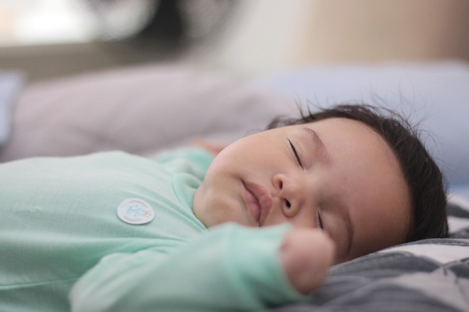3.8: Sleep
- Page ID
- 139641
Importance of Sleep
Along with food and nutrition, sleep is critical during the first three years to promote healthy development. Sleep develops rapidly during the first few years of life and is a highly dynamic process with many changes during the first three years. At birth, infants do not have an established circadian rhythm to regulate their sleep–wake cycle and therefore sleep across multiple intervals throughout the day and night in short bouts, which may also be due to infants’ feeding needs (Davis, Parker & Montgomery, 2004). At about 10 to 12 weeks of age, the first signs of a circadian rhythm begin to develop, marked by an increase in sleeping through the night (Mirmiran, Baldwin & Ariagno, 2003). The change in total sleep duration over 24 hours decreases from 16 to 17 hours in newborns, to 14 to 15 hours at 16 weeks of age, and then decreases further to 13 to 14 hours by 6 months of age (Adams, Jones, Esmail & Mitchell, 2004; Galland, Taylor, Elder & Herbison, 2012). While the need for day sleep decreases, night sleep duration increases through the first year of life, resulting in a shift towards a more nocturnal pattern of sleep (Bruni et al., 2014; Iglowstein, Jenni, Molinari & Largo, 2003; Sadeh, Mindell, Luedtke & Wiegand, 2009). [1]

Concerns that children are not getting enough sleep have been around for over one hundred years, with recommendations of ideal sleep duration for children being provided as early as 1897 (Matricciani et al., 2012). The National Sleep Foundation (NSF) recommends a daily sleep duration of 14 to 17 hours each day from birth to 3 months, 12 to 15 hours each day from 4 to 11 months, 11 to 14 hours each day for infants aged 1 to 2 years, and 10 to 13 hours each day for preschoolers aged 3 to 5 years (Hirshkowitz et al., 2015). However, many infants and toddlers sleep less than the recommended amount (Matricciani et al., 2012). Figure \(\PageIndex{2}\) shows sleep duration data across ages. As can be seen in the figure, the total amount of hours varies the most during infancy, followed by slightly less variability during toddlerhood. From the preschool years to later childhood, there is little variability as children’s sleep duration stabilizes and the total amount of hours they sleep becomes consistent. Short sleep duration is particularly prevalent in predominantly Asian countries. A study conducted on caregivers of 29,287 children between the ages of 0 and 36 months from seventeen countries reported that total sleep duration in children from predominantly Asian countries is significantly lower than children from predominantly Caucasian countries (Mindell et al., 2010). Moreover, regardless of age group, children from predominantly Asian countries consistently sleep less. [1]

Sleep is important for infants and toddlers because sleep plays a significant role in memory consolidation, language acquisition and cognitive development (Tham, Schneider & Broekman, 2017). Memory consolidation is a process whereby a memory becomes more stable and resistant to being forgotten (Rasch & Born, 2013; Stickgold & Walker, 2007). For example, six and twelve month old infants who napped for at least 30 minutes after learning a set of object–action pairings from a puppet toy recalled significantly more target actions when tested after a 24-hour delay compared to infants in the no-nap group (Seehagen, Konrad, Herbert & Schneider, 2015). This study suggests that napping during infancy can help in the consolidation of memories, like learning new actions. [4]
After learning an artificial language, 15 month old infants who napped for at least 30 minutes, compared to those who did not nap at all, were able to abstract grammatical relations among words at a later test session that occurred 4 hours after learning (Gómez, Bootzin & Nadel, 2006). In a follow-up study, the benefits of napping for language learning persisted even after 24 hours (Hupbach, Gomez, Bootzin & Nadel, 2009). Sixteen month old infants who napped after learning sets of new object–word associations spent more time looking at the correct associative pairing at the 2-hour delayed test session, whereas infants who remained awake did not display any differences in looking between the learning and delayed test sessions (Horváth, Myers, Foster & Plunkett, 2015). These studies suggest that napping can enhance aspects of language learning. [4]

While taking naps and greater overall sleep can benefit cognitive and language development, less quality sleep and less overall sleep is negatively related to developmental outcomes. Greater movements or activity during sleep and greater number of awakenings after sleep onset were negatively correlated with scores on the Bayley Scales of Infant and Toddler Development Mental Development Index (BSID-MDI) amongst 10 month old infants (Scher, 2005). In contrast, greater sleep efficiency (i.e. spending a larger percentage of time asleep between sleep onset and wakefulness) was positively correlated with BSID-MDI scores in the same group of infants. Besides sleep efficiency, longer proportions of sleep at night were also associated with better cognitive problem-solving skills (Gibson, Elder & Gander, 2012). Higher percentages of parent-reported night sleep (out of total sleep duration) at 12 and 18 months of age were significantly associated with better executive functioning performance at 26 months of age, especially performance related to impulse-control tasks (Bernier, Carlson, Bordeleau & Carrier, 2010). The benefits of higher percentages of sleep duration at night extend beyond toddlerhood. Findings from a follow-up study report that 12 month old infants with higher proportions of night sleep displayed better executive functioning performance at 4 years (Bernier et al., 2013). [4]
[1] Tham et al., (2017). Infant sleep and its relation with cognition and growth: A narrative review. Nature and Science of Sleep, 9, 135.
[2] Image by AMIT RANJAN is on Unsplash.
[1] Rudzik, A. E., & Ball, H. L. (2021). Biologically normal sleep in the mother‐infant dyad. American journal of human biology, e23589. CC by 4.0
[4] Tham et al., (2017). Infant sleep and its relation with cognition and growth: A narrative review. Nature and Science of Sleep, 9, 135.
[1] Image by adiretoriaeventos on Pixabay.

